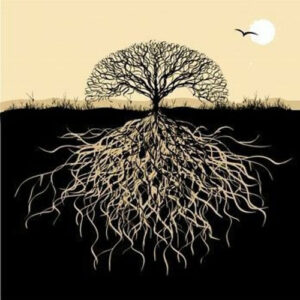Ancestor In The Blood
 What manner of scholar am I? What is my standard of workmanship? Nietzsche suggests a certain tenor is transmitted from our ancestors way of life. Is there a “prehistory” that haunts the sweep of these blog entries?
What manner of scholar am I? What is my standard of workmanship? Nietzsche suggests a certain tenor is transmitted from our ancestors way of life. Is there a “prehistory” that haunts the sweep of these blog entries?
My father grew up poor, raised by a single mother, helping to support my grandmother and his three sisters by means of a paper route. After discharge from the armed services at the end of WWII he was hired as a machine operator by the American Tobacco Company. He worked there until he retired. The day-to-day way of life seemed to this child an equal partnership between my dad and my mother.
My mother said more than once that she, one of eight sisters, and a brother, never knew they were poor. Her father, my grandfather, a yeoman farmer, tended the family farm until he retired. Mother said that my grandfather kept his farm animals beyond the time when his condition of health permitted him to easily care for them. He loved his animals.
Is any of my ancestor-in-the-blood revealed in these posts? Tenacity, dedication, self-pity, love…
In Europe scholars grow
out of all kinds of classes
and social conditions,
like plants
that require
no particular soil…
Once one has trained one’s eyes
to recognize in a scholarly treatise
the scholar’s intellectual idiosyncrasy–every scholar has one
— and to catch it in the act,
one will almost always behold
behind this the scholar’s “prehistory,” his/her family,
and especially their occupations and crafts.
…it is generally the ancestor in the blood
and instinct of the scholar who approves
from his point of view
“the finished job”…
a symptom of what in a hard-working family
has for ages been considered “good workmanship.”
The sons of protestant ministers and school teachers
may be recognized by their naive certainty when,
as scholars, they consider their cause proved
when they have merely stated it with vigor and warmth;
they are thoroughly used to being believed,
as that was part of their fathers’ job.
A Jew, on the other hand,
in keeping with the business circles
and the past of his people,
is least of all used to being believed.
Consider Jewish scholars in this light:
all of them have a high regard for logic,
that is for compelling agreement by force of reasons;
they know, with that they are bound to win
even where they encounter race and class prejudices
and where one does not like to believe them.
For nothing is more democratic than logic;
it is no respecter of persons
and makes no distinction
between crooked and straight noses.
Wherever Jews have won influence
they have taught men to make finer distinctions,
more rigorous inferences,
and to write
in a more luminous and cleanly fashion;
their task was ever to bring a people
to listen to raison*.
–excerpt The Gay Science, Book 5, Section 348 by Friedrich Nietzsche
*Walter Kaufman, the well respected translator notes that Nietzsche uses the French word for reason to dissociate himself from the Germans and German anti-Semitism.